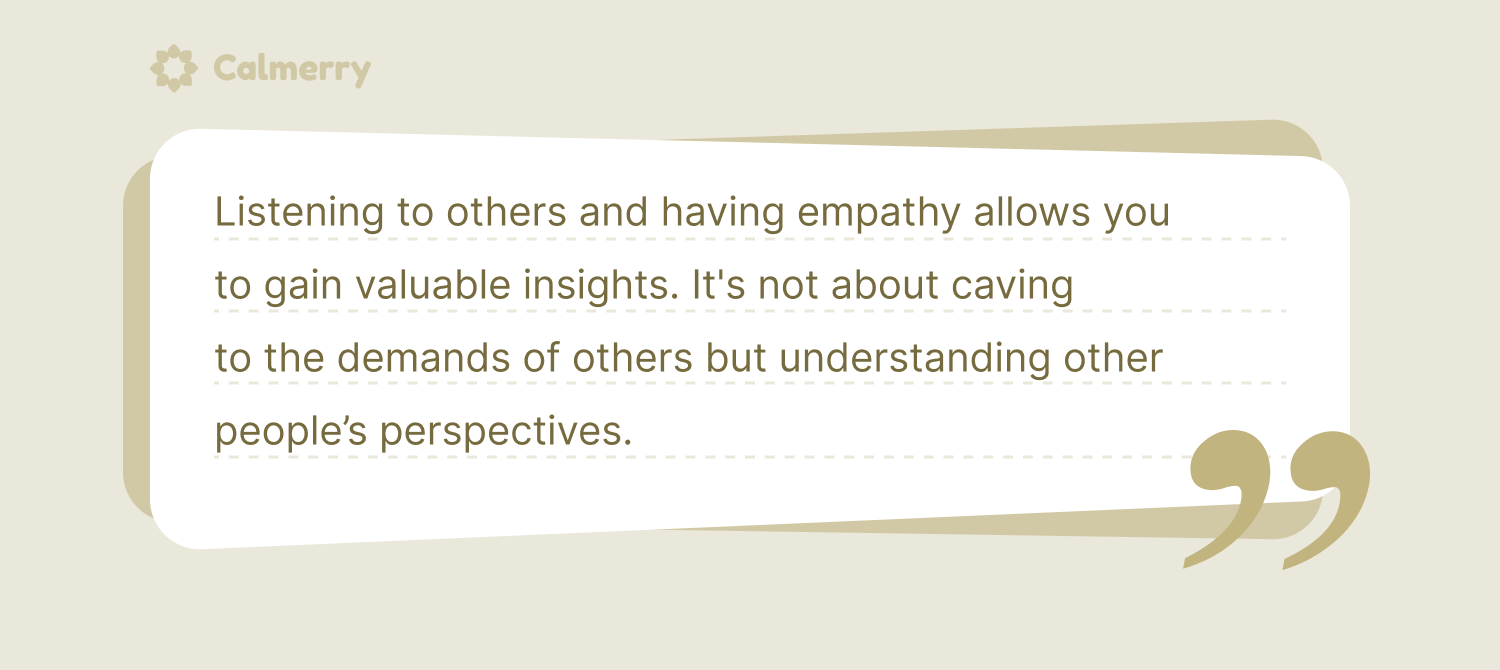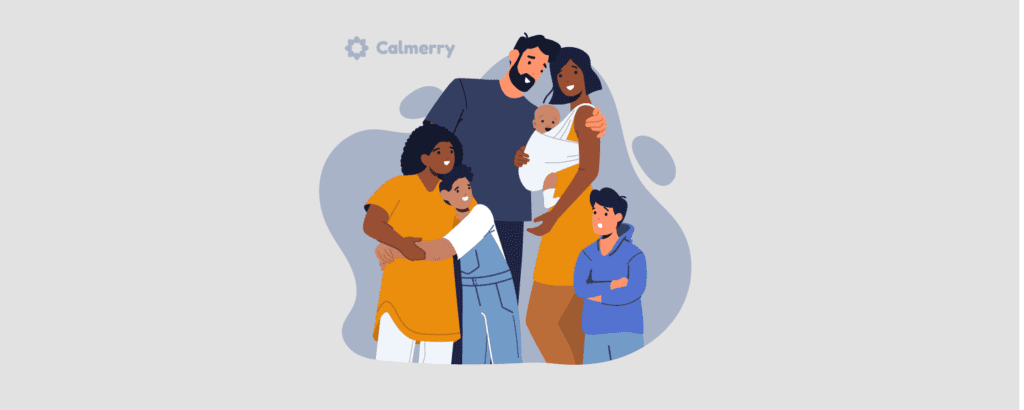Causes of Family Conflicts and How to Resolve Them

In this article
Being part of a family can be pretty beneficial as it brings you love, security, and support. Family members who understand and appreciate you can help you overcome many challenges that life throws at you. But sometimes, there can also be conflict.
It’s common for family members to have disagreements. While conflicts are rather natural, healthy, and unavoidable, when they remain unresolved or escalate, they can become a significant cause of stress and problems in relationships.
Family conflicts can be particularly distressing because they are so deeply personal. You may feel tied to your family and unable to distance yourself or let go. Besides, when certain problems arise over and over again for many years, it can be easy to get stuck in familiar patterns of interaction.
If conflicts have become a problem in your family and you’re struggling to find ways to resolve them, this article will give you some tips that might help.
We also asked Tiffany Lovins, a Licensed Mental Health Counselor at Calmerry, to share some insights into this subject. But before we tell you how to deal with family conflicts, let’s first take a quick look at some of the most common causes.
Causes of family conflict
“Belonging to any part of a group or system naturally creates an environment that is rich with individual differences in wants, needs, beliefs, and values,” explains Tiffany and goes on, “Our own family system is no different in this regard and is often even more complicated due to the closeness of these relationships and the interdependence that exists in a family unit.”
Tiffany also notes that the underlying causes of conflict may not be obvious: “There are several primary causes of family conflict that are most often experienced, though they all hold an underlying theme regardless of the topic at hand. The top causes for conflict are often finances, child-rearing, and discipline, involvement of in-laws, sibling rivalry, or push for autonomy within the family unit.”

“Regardless of the cause, all contain an underlying theme of incongruency in expectations and communication that ultimately lead to conflict in these areas.”
Lack of communication
One of the most common factors that trigger conflict in a family is a lack of open communication. Without effective communication, it becomes difficult for family members to make sure that their needs are met, and their boundaries are respected.
The lack of communication may also make a person feel like their needs and desires are not worth sharing. As a result, family members may get stuck in a vicious circle where previous communication problems create new ones.
Family duties
Family conflicts also often stem from responsibilities. Misunderstandings may arise from the way family members divide household chores and other responsibilities.
For instance, there might be arguments regarding who is supposed to take care of children or elderly family members. Although these are often small conflicts, they may last for a long time if left unresolved.
Money
Disagreements related to financial issues can have a severely destructive impact on all kinds of relationships, including those between romantic partners and family members. Spouses and siblings often argue over money management. And the situation may get even more difficult if there are any inheritance issues in the family.

Differences in values
This is a very common cause of conflict between romantic partners and between parents and their children. People may hold different opinions regarding politics, morals, culture, etc. There is often a greater risk of this as children shift into developmental stages, where strengthening their independence and identity take center stage.
As a result, partners or family members may lose the sense of unity, and the whole family dynamics may shift in a negative direction.
Blended families
When two families start to live together, they enter a risky area because the more people are involved, the more likely things may go wrong.
Given that even people who’ve shared the same roof for years may have serious conflicts, it’s no surprise that the situation might get more complicated when introducing new people – each with their unique needs, views, and habits.
This can be further complicated if the children have multiple households where different expectations and rules are held.
Goals and expectations are out of sync
“There are often unspoken rules, norms, and beliefs about everyone’s role in the family and resulting expectations attached to each role,” explains Tiffany Lovins, “When these expectations and needs of the individual are not openly communicated and aligned, it can result in each member reacting on assumptions and emotions, thus creating a breeding ground for conflict.”
The counselor adds, “Once this is put into motion, each individual tends to resort to their default communication style, which further alienates each person from the other. Some may become passive and shut down. Others may attack or respond aggressively.”
Tiffany notes that this way, the mutual goals of the family can be lost in the process. And this increases the vulnerability of each to blame and attack rather than partnering together to address concerns.
“Identifying and stating openly that the mutual goal is always to create a space of health and happiness for each individual and the family can be a great starting point for difficult conversations,” comments Tiffany.
How to resolve family conflicts

No matter what caused a particular argument, it’s important to know how to prevent further escalation and minimize the probability of such conflicts happening in the future.
Here are the 10 tips for navigating family conflicts and improving your communication skills.
1. Accept what you can and cannot control
No matter how much you may want to, you cannot control the behavior of others. But you can control how you respond. Think of the conflicts you’ve had in the past, how you reacted, and what the outcomes were.
If the results don’t match your expectations, reflect on your approach and determine if it accurately reflects your intended need or request in a way that maintains your self-respect and the respect of the relationship. If not, try responding differently next time; hopefully, it will have a more positive effect.
Changing the way you respond makes you less predictable, making it harder for others to trigger or manipulate you into conflict. Suppose you have communicated as effectively as possible, and it is still not well received. In that case, this may indicate a need to redefine the boundaries and expectations in this relationship.
2. Let any anger subside
It’s better to let things calm down before trying to resolve a conflict so that you can have a rational and constructive conversation. When emotions are high, the functional part of our brains goes offline, and it truly makes it hard to have a reasonable discussion with effective solutions. Try talking in a calm tone and put any emotions aside.
If you try to resolve a conflict while people are angry and lashing out, such attempts may fail or even worsen the situation further. Remember, the goal here is not to win an argument but to find a healthy and mutually beneficial resolution.
3. Try to understand other family members’ perspectives
It’s important to give other family members a chance to express their views without being interrupted. And you should also request an opportunity to do the same
Listen actively: try to understand things from other peoples’ perspectives and then identify what you could do differently to help resolve the conflict. Listening to others and having empathy is a way to be fair and gain valuable insights. It’s not about submitting or caving to the demands of others.
4. Understand how it affects the whole family
It’s easy to get caught up in a conflict without realizing how much it’s affecting those around you. For example, when parents argue, children can often pick up on their stress and mood changes, even if they try to hide them.
However, when the family members involved in a conflict understand how it’s hurting the rest of the family, they’re more likely to be open to finding a resolution.

5. Use “I” instead of “you”
When you’re attempting to resolve a conflict, “you”-statements may sound like accusations, triggering a defensive response and making it harder to connect.
Use “I”-statements and talk about how you feel instead. You’ll be less likely to trigger other people’s defenses while highlighting your personal perspective, your emotions, and the critical issues you need to work through.
6. Recognize that some issues aren’t worth fighting over
Not every issue is worth fighting over. For example, if your partner or kids did something trivial that bothered you, such as not putting the bins out, consider whether such an issue would be worth getting into an argument about.
Remember, accidents can happen, people can forget, everyone makes mistakes, and not everything is done to hurt you intentionally.
However, this doesn’t mean you should tolerate toxic or abusive behavior. And you have the right to be concerned and speak up if you often moderate yourself because of the fear of other family members.
7. Try reaching out rather than withdrawing
If you see other family members as a threat, you may withdraw as a way to protect yourself. However, isolating yourself can prolong the issues between you and make it harder to resolve the conflict.
So, when you feel like withdrawing, try being the bigger person and reaching out instead. Taking a risk and making the first move often pays off, giving you and other family members a chance to resolve things and reconnect.
8. Work as a team
A healthy family is a solid unit, but families consist of multiple people. Even couples without children may run into conflicts of interest. And the situation may not get any easier if people have children or live with other relatives.
To ensure mutual understanding and support, it’s important to agree on common goals and everyone’s individual contribution.
“Making an effort to have intentional conversations about expectations of each other and each person’s role in meeting these goals is critical, especially as each individual evolves (and so do their needs and capabilities),” explains Tiffany Lovins.
9. Seek professional help and support if needed
For many people, family is a major part of their lives, and they consider it worth investing in to get it right. Seeking impartial guidance and the help of an expert can help you and your family work through any challenges effectively.
Whether it’s relationship therapy to help build a healthy romantic relationship or online counseling to improve your anger management skills, there’s professional support available for all types of issues.
Those stuck in toxic relationships can also benefit from emotional abuse help.
10. Minimize or end contact completely if nothing helps
While it often pays off to reach out rather than withdraw, some conflicts are simply unresolvable, and you’re better off minimizing or ending contact entirely.
This applies particularly to situations where abuse has occurred, and you expect it could continue in the future. Ending contact is usually the last option, but it’s worth considering if your or your loved one’s health and well-being are at risk.
If you’re a victim of abuse, please contact the National Domestic Violence Hotline. If you’re in immediate danger, please call 911.
Summing up
While family conflicts can cause considerable distress and anxiety, finding a healthy resolution is often possible. Remember to let things cool off first and try to consider other family members’ perspectives. Improving your conflict resolution skills is a worthwhile endeavor that could help you in many areas of your life.
If you need additional support, seeking the help of a professional is always a wise choice. Here at Calmerry, our online therapists are ready to work with you individually to resolve any emotional problems you have and improve your mental well-being.
online therapy
live video session


